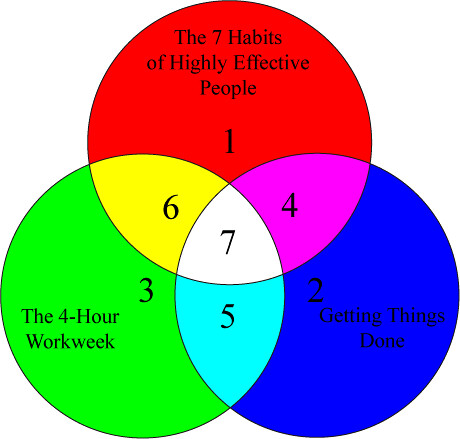
The 4-Hour Workweek borrows concepts from popular books like The 7 Habits of Highly Effective People and Getting Things Done while adding an attitude of its own. This post compares and contrasts the time management advice of these three books:
- The 7 Habits of Highly Effective People (The 7 Habits) by Stephen R. Covey,
- Getting Things Done (GTD) by David Allen, and
- The 4-Hour Workweek by Timothy Ferriss.
- The 7 Habits begins with principles and time management paradigms, and then proceeds to habits and time management tools. Previous posts have discussed some of these principles, but the concept most relevant to time management is Quadrant II. This concept affects the habits and tools Covey recommends.
Covey notes that activities vary in both importance and urgency. Classifying activities as "Urgent" or "Not Urgent" and "Important" or "Not Important" produces a time management matrix with four quadrants (illustrated both in The 7 Habits and in First Things First). Quadrant I is important and urgent, Quadrant II is important but not urgent, Quadrant III is urgent but not important, and Quadrant IV is neither important nor urgent.
The habit for time management is Habit 3, "Put First Things First". Habit 3 is based upon Habit 1, "Be Proactive," and--especially--Habit 2, "Begin with the End in Mind." "The basic problem is that their priorities have not become deeply planted in their hearts and minds," writes Covey. His time management advice is essentially, "Organize and execute around priorities." His top-down organization strategy begins with a mission statement, which defines roles, which have goals, which require plans, which become schedules.
Covey also classifies time management tools into four generations: notes and checklists (first generation); calendars and appointment books (second generation); and priorities, goals, and plans (third generation). His fourth generation time management shifts emphasis: from efficiency with things and time, to effectiveness with relationships and results. "Subordinate your schedule to a higher value," he writes. - GTD approaches time management from the bottom up rather than the top down like The 7 Habits. The GTD approach is to deal effectively with internal commitments using simple tools. The problem, writes Allen, is new demands and insufficient resources. His process is managing action; time, information, and priorities aren't changed by management.
Allen's tools are primarily notes, checklists, calendars, and appointment books--the first and second generations of Covey's classification. Similarly his plans are informal and focused on the Next Action. - The 4-Hour Workweek focuses on freedom, so its time management advice is in "Step II: E is for Elimination". Ferriss' question is, "How can one achieve the millionaire lifestyle of complete freedom without first having $1,000,000?"
Since The 4-Hour Workweek is about freedom, and Step II is Elimination, Ferriss calls his chapter 5 "The End of Time Management." The chapter begins, "Just a few words on time management: Forget all about it." His strategy follows from the Pareto principle and Parkinson's law: focus on the vital few by shortening work time. His "Questions and Actions" pages elaborate on this principle by clarifying what activities really get one closer to goals in contrast to activities fill time and help avoid more important (and anxiety-producing) activities. - While The 4-Hour Workweek focuses on freedom, both Covey's The 7 Habits and Allen's GTD focus on peace of mind. For Covey, "Peace of mind comes when your life is in harmony with true principles and values and in no other way." Allen promises relaxed, stress-free productivity, a "mind like water." However, their paths to peace differ.
Covey mentions crises more than stress. For Covey, crises are Quadrant I activities:[Effective people] also shrink Quadrant I down to size by spending more time in Quadrant II. Quadrant II is the heart of effective personal management. It deals with things that are not urgent, but are important. It deals with things like building relationships, writing a personal mission statement, long-range planning, exercising, preventive maintenance, preparation--all those things we know we need to do, but somehow seldom get around to doing, because they aren't urgent.
For Allen, being stress-free also involves being prepared, but by being in control (see Ready for Anything as quoted in Wikipedia):Get everything out of your head. Make decisions about actions required on stuff when it shows up — not when it blows up. Organize reminders of your projects and the next actions on them in appropriate categories. Keep your system current, complete, and reviewed sufficiently to trust your intuitive choices about what you're doing (and not doing) at any time.
Covey and Allen also both specifically address knowledge work. Covey's comments are in The 8th Habit. - Neither GTD nor The 4-Hour Workweek spend much time on principles and values compared to The 7 Habits . For Allen, values don't solve the problems of new demands and insufficient resources. For Ferriss, focus on values first requires free time.
Allen writes, "And what created most of the work that's on those [to do] lists in the first place? Our values!" Priorities are also less important than context, time available, and energy available:"Setting priorities" in the traditional sense of focusing on your long-term goals and values, though obviously a necessary core focus, does not provide a practical framework for a vast majority of the decisions and tasks you must engage in day to day.
Ferriss, rather than beginning with "big questions" of principles and values, ends with them in chapter 15: "Filling the Void: Adding Life After Subtracting Work." This chapter proposes "the point of it all" as "life exists to be enjoyed and... the most important thing is to feel good about yourself.... to love, be loved, and never stop learning...." This discussion borrows from Covey without attribution, also calling learning "sharpening the saw," Covey's 7th habit. - While The 4-Hour Workweek leaves values to the end, it begins with imagination and goal-setting in "Step I: D is for Definition." Ferriss, like Covey, starts with imagining a motivating state, both "being" and "doing", and sets goals to reach that end result. Both warn against expending effort that doesn't achieve that end. Covey writes, "It's incredibly easy... to work harder and harder at climbing the ladder of success only to discover it's leaning against the wrong wall." Ferriss, like Covey, contrasts effectiveness and efficiency:
Effectiveness is doing things that get you closer to your goals. Efficiency is performing a given task (whether important or not) in the most economical manner possible. Being efficient without being effective is the default mode....
In The 4-Hour Workweek, the end is a state of excitement in the next 6 to 12 months. In The 7 Habits, the end is a life mission centered on principles. Nevertheless both emphasize the need for a motivating vision of the future. - All three authors--Covey, Allen, and Ferriss--discuss delegation. Delegation is both a part of work flow and a way to empower.
Delegation plays a similar role in the work flow in both The 7 Habits and GTD. In The 7 Habits plans become either appointments to schedule or stewardship to delegate. In GTD, after determining the Next Action, the next part of the process is to do it (if it takes less than two minutes), delegate it (if someone else is the right person to do it), or defer it. Consistent with its pursuit of freedom, The 4-Hour Workweek has the following advice:Delegation is to be used as a further step in reduction, not as an excuse to create more movement or add the unimportant.... Never automate something that can be eliminated, and never delegate something that can be automated or streamlined.
The 7 Habits and The 4-Hour Workweek also discuss empowerment. The 7 Habits likens empowerment to leverage, enabling a manager to invest a smaller amount of time with equivalent result--provided the person accepting the task takes stewardship of the desired results, within guidelines, and with accountability and consequences. Similarly, The 4-Hour Workweek emphasizes the time advantages of empowering others, and says, "People are smarter than you think. Give them a chance to prove themselves."
